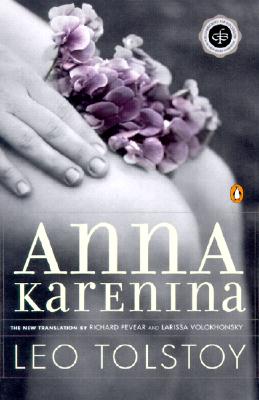My Thoughts on pp.275-483
- How Karenin went about deciding what to do with Anna was chilling, and quite indicative of the initial state of their marriage, I think (verified in the quote from p. 427 below). He really is very cold and methodical about it all: more concerned with the political/social appearance than anything else. Love and compassion seem to have never had a place in their marriage, which makes my view of Anna's affair change somewhat. She seems friendless and directionless in many senses. (see quotes below: from p. 282-3 for his view, and from p. 287 for hers) I like that, a bit further on, he finally lets himself connect with true feeling (see quote from p. 410-11 below.)
- The crumbling aristocracy...Levin's discussion with others in his class about the structure of farming and peasantry etc. is somewhat like the Occupy movement from the opposite direction, yeah? Anyhow, I find it interesting to compare the problems of one social/political structure to another, especially when we can see some of the outcome of one, and are living in the other. I don't really know what my verdict is about the comparison, but it is adding something to the [thought] pot.
- I'm completely sucked into the plot, so much so that I didn't write down as many quotes as I thought I might. From the complete awkwardness when Stepan ran into Alexei Alexandrovich, to Levin and Kitty matching up and the whole wedding ceremony, and Vronsky's reaction to Karenin's return! There is so much going on in this section that I'm just enthralled.
- Characters--not liking Anna so much any more. I get that her choices were slim, but I don't really like Vronsky, so the fact that she does dampens my affection for her. :) These sections took me from feeling irritated with her to being sympathetic and back to irritated (which has actually been a great thing to experience.) I'm also not as in love with Levin as I was. I like him fine, but it's really starting to irritate me that he gets so moody. He can't handle truth being spoke of aloud and plainly, which is something I really don't think I could live with. (I'm starting to feel sorry for Tolstoy's wife, if Levin=Tolstoy!) My favorites right now are Stepan and Dolly...strange, since they played a minor role in this section.
Quotes from pp.275-483
- p. 282-3: [Alexei Alexandrovich's thoughts:] “I cannot be unhappy, but neither should she and he be happy.” [...] “She should be unhappy, but I am not guilty and therefore cannot be unhappy.”
- p. 287: [Anna's thoughts:] ...in the depths of her soul she considered her situation false, dishonest, and wished with all her soul to change it. [...] It might be bad, this new situation, but it would be definite, there would be no vagueness or falsehood in it.
- p. 334: [Levin's POV] ...but the landowner, like all people who think originally and solitarily, was slow to understand another man’s thought and especially partial to his own.
- p. 375: [Levin:] “It’s true that it’s time to die. And that everything is nonsense. I’ll tell you truly: I value my thought and work terribly, but in essence--think about it--this whole world of ours is just a bit of mildew that grew over a tiny planet. And we think we can have something great--thoughts, deeds! They’re all grains of sand."
- p. 410-11: Alexei Alexandrovich stopped and went pale. He now realized clearly how strongly he had desired her death. [...] ...feeling slightly relieved at the news that there was after all some hope of death, he went into the front hall.
- p. 415: [Vronsky] did not understand Alexei Alexandrovich’s feelings. But he felt that this was something lofty and even inaccessible to him in his world-view.
- p. 427: [Stepan to his sister Anna:] “I’ll begin from the beginning: you married a man twenty years older than yourself. You married without love or not knowing what love is. That was a mistake, let’s assume.”
- p. 435: [Vronsky's thoughts:] He simply could not understand how, at this moment of their reunion, she could think about her son, about divorce. Was it not all the same?
- p. 465: [Vronsky:] He soon felt arise in his soul a desire for desires, an anguish.

No comments:
Post a Comment
I'd love to hear what you have to say, leave a comment!